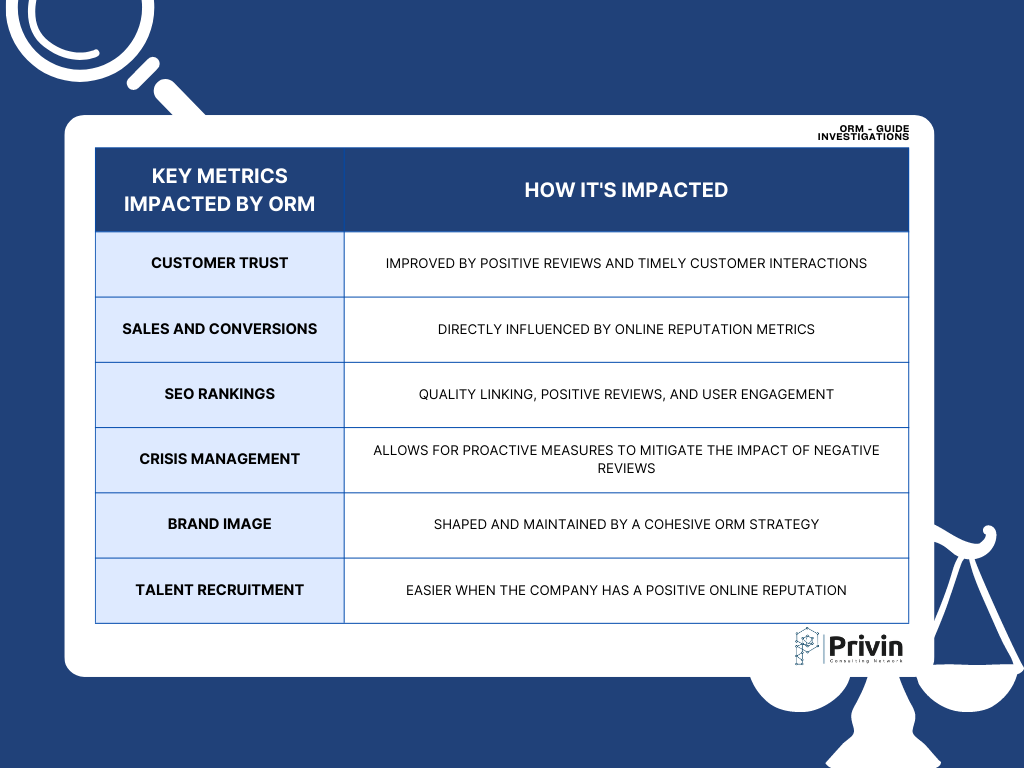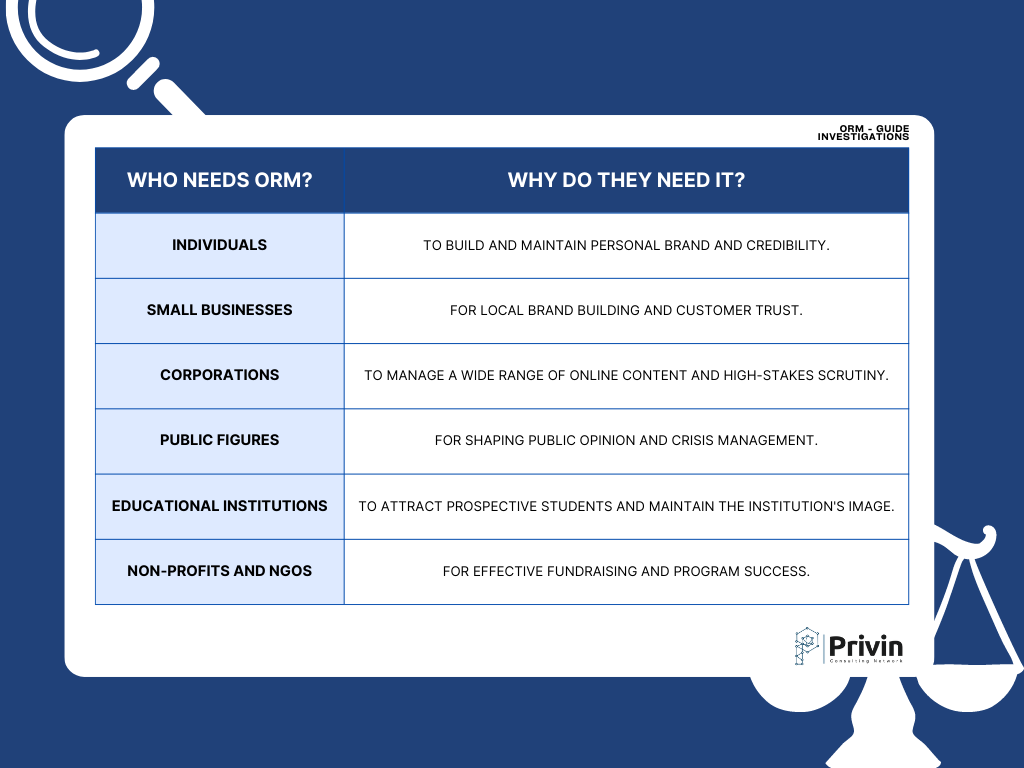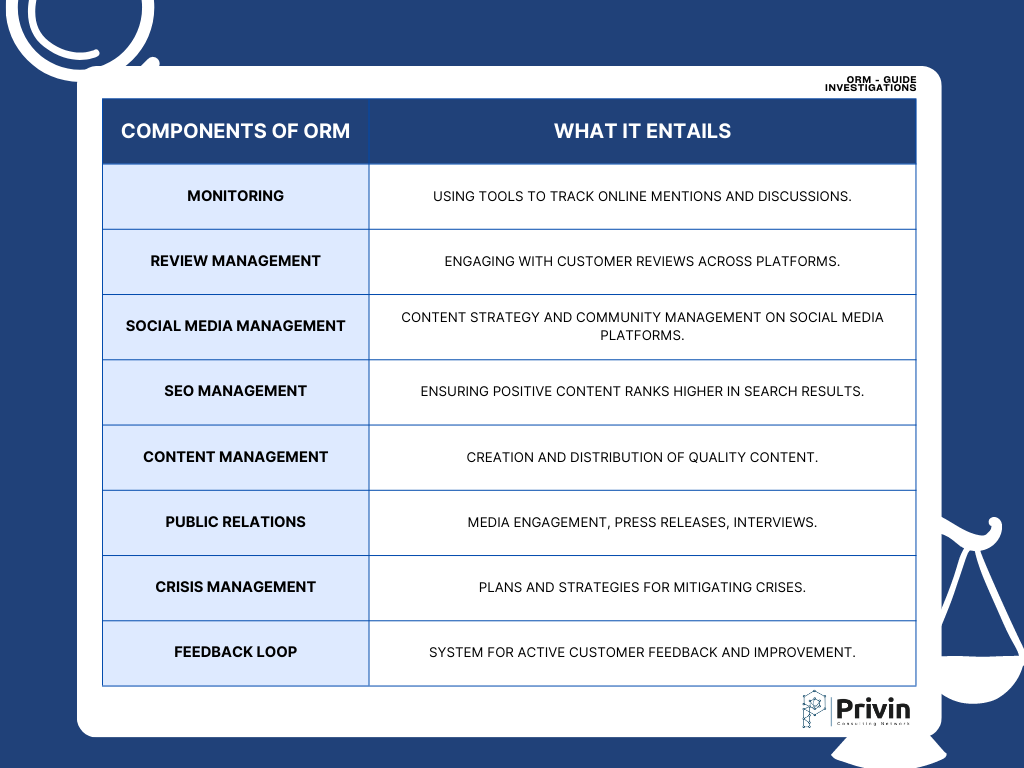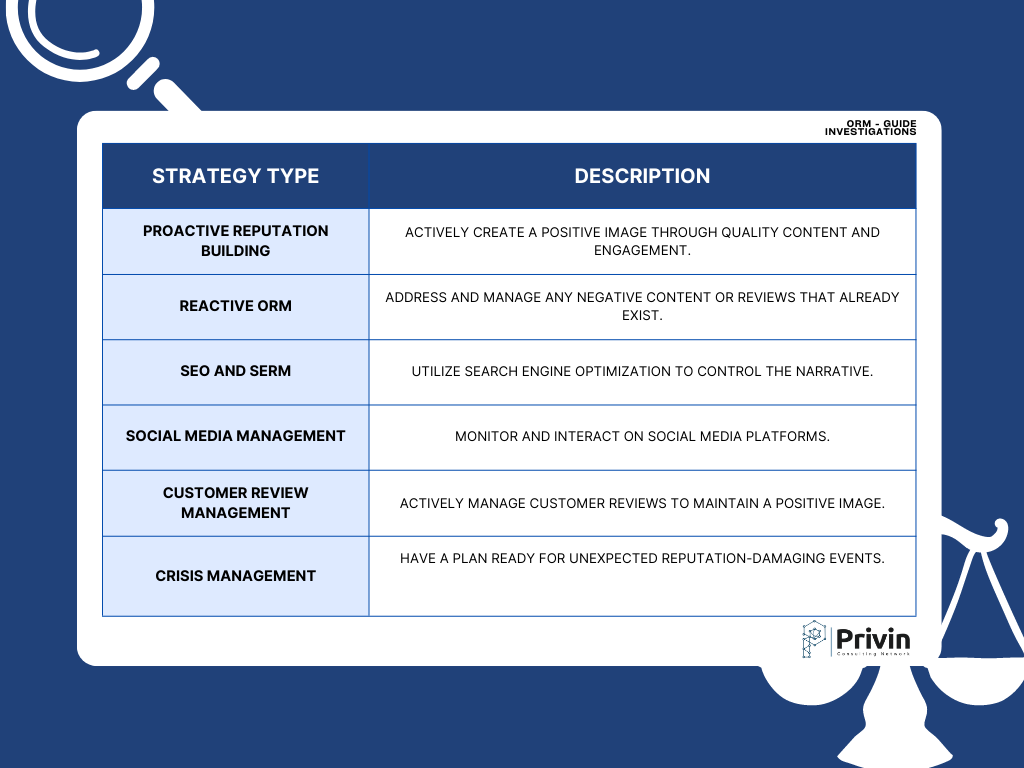Online Reputation Management: A Comprehensive Guide
In a world where almost everything is digitized, your online reputation often acts as your first impression. It’s the deciding factor that can either build or break your personal brand, business, or organization. Gone are the days when reputation management was merely about public relations; in today’s connected world, Online Reputation Management (ORM) is indispensable. A single tweet, a solitary negative review, or an isolated blog post can profoundly impact how you or your brand is perceived online. Consequently, ORM isn’t a ‘nice-to-have’ but a ‘must-have.’
In this comprehensive guide, we’ll dive into every nook and cranny of Online Reputation Management. You’ll discover what ORM is, its various components, why it’s vital for your brand, and the best strategies and tools to effectively manage your online reputation. So, whether you’re an individual, a small business owner, a marketer, or the CEO of a large corporation, this guide is your one-stop-shop for everything you need to know about ORM.
Table of Contents
- What is Online Reputation Management?
- Why is ORM Important?
- Who Needs ORM?
- Components of ORM
- Monitoring Online Reputation
- ORM Strategies
- Common ORM Mistakes
- Future of ORM
- Conclusion
What is Online Reputation Management?
Online Reputation Management (ORM) is the multifaceted process of influencing, controlling, and managing the online perception of an individual or a brand. Unlike traditional reputation management, which focuses on public relations and public perception through media outlets, ORM concentrates on the digital space. It’s a blend of public relations, marketing, and search engine optimization (SEO), all geared towards portraying you or your brand in the best possible light.
Subcomponents of ORM
- Search Engine Results: This involves managing how your brand or personal name appears in search engine results, making sure that positive and relevant content ranks higher than any negative or irrelevant content.
- Social Media Presence: ORM involves curating a brand’s persona on social media platforms, including what kind of content gets posted and how user interactions are managed.
- Reviews and Testimonials: Online reviews on platforms like Yelp, Google My Business, and TripAdvisor can make or break a business. ORM includes managing these reviews to maintain a favorable public opinion.
- Content Management: From blogs to articles to social media posts, the type of content you produce speaks volumes about your brand. Effective ORM strategies include creating content that not only promotes your brand but also addresses the concerns and needs of your audience.
- Crisis Management: In today’s fast-paced digital world, a crisis can escalate quickly. ORM involves having strategies in place to manage negative comments, reviews, or press.
- Public Relations: Lastly, ORM entails managing press releases and media relations to ensure the dissemination of positive news and updates about the brand.
In essence, ORM provides you with a toolkit to manage the complex web of information about you or your brand that exists online. In the following sections, we’ll explore how to use this toolkit effectively.
Why is ORM Important?
The importance of Online Reputation Management cannot be overstated in today’s digital ecosystem. Many people might ask, “Why invest time, effort, and resources into something as nebulous as ‘reputation’?” The reasons are manifold and can significantly impact various facets of your business or personal brand.
Building Trust and Credibility
Trust is the cornerstone of any successful venture. According to a BrightLocal survey, 82% of consumers read online reviews for local businesses, and among those, 91% trust online reviews as much as personal recommendations. When your online reputation is strong, new customers are more likely to trust your brand over competitors who lack a positive online presence.
Influence on Sales and Conversions
Consumers nowadays turn to the internet for all sorts of purchase decisions. Even for offline purchases, a Forrester report suggests that over 80% of retail sales will still touch digital at some point along the journey. If prospective clients find negative reviews on the first page of their search results, your chances of closing the deal can plummet.
Search Engine Optimization (SEO)
Search engines aim to offer the most relevant and beneficial content to users. They also factor in ‘trust,’ which is greatly influenced by your online reputation. A high number of negative reviews, for instance, can result in lower search engine rankings. This relationship between ORM and SEO is a symbiotic one, and mastering it can propel your brand to new heights.
Crisis Management
In a digital landscape, news—good or bad—spreads like wildfire. With ORM, you can monitor mentions of your brand, allowing you to address issues before they escalate into crises.
Establishing a Strong Brand Image
Your online reputation is part of your brand’s intangible assets, along with brand recognition and consumer goodwill. A robust ORM strategy helps in shaping the perception people have of your brand, making you stand out in the market.
Attracting Talent
It’s not just customers who care about reputation; top talent also wants to work for reputable companies. Platforms like Glassdoor offer an inside look into a company’s culture, and a poor reputation can deter skilled professionals from applying.3
As is evident, the importance of ORM stretches across the entire lifespan of a brand, from its formation to its operational success. Its absence could mean leaving your brand’s image to random chance and volatile public opinion.

Who Needs ORM?
Online Reputation Management isn’t a one-size-fits-all solution reserved for big corporations or celebrities. Its applications are diverse, affecting entities ranging from individuals to small businesses and from NGOs to large corporations. Let’s delve into each segment to understand why ORM is critical across different spectra.
Individuals
Professionals like doctors, lawyers, freelancers, and even job seekers can benefit from ORM. Your online persona can heavily influence your career trajectory. For instance, a potential employer is likely to Google your name before offering you a job. Your digital footprint, including social media posts and previous work experiences listed on platforms like LinkedIn, contributes to your personal ‘brand.’
Small Businesses
Local businesses may not have the sprawling scale of larger organizations, but they often face the most immediate impact from online reputation. Customer reviews and ratings on platforms like Yelp or Google My Business can dramatically affect foot traffic and sales. Small businesses also benefit from cultivating a local, community-based brand identity that can be immensely bolstered through effective ORM.
Corporations
Large corporations often have dedicated teams or outsource ORM activities to specialized firms. They must manage a wide range of online content, from press releases and news articles to online reviews and social media mentions. The stakes are high, and so is the level of scrutiny, which is why comprehensive ORM strategies involving real-time monitoring and quick responses are essential.
Public Figures
Politicians, celebrities, and social influencers are constantly in the public eye. A single controversial tweet or a past indiscretion coming to light can lead to public outrage. Hence, ORM is crucial not just for shaping public opinion but also for crisis management for these individuals.
Educational Institutions
Schools and colleges are increasingly finding that their online reputations matter. Prospective students and parents often research institutions online before making their choice, and negative reviews or news can dissuade them. ORM can help educational institutions manage their image effectively.
Non-Profits and NGOs
Even organizations that are not profit-oriented need ORM. Their effectiveness in fundraising, member recruitment, and program success can hinge on their online reputation.

Understanding the role ORM plays across these different entities helps to underscore its universal relevance. Regardless of your professional or personal standing, your online reputation is a valuable asset that needs meticulous management.
Components of ORM
Online Reputation Management is not a monolithic practice but rather a multi-faceted operation that involves several key components. Knowing these components can provide a granular understanding of what makes up ORM and how each element plays a crucial role in forming the bigger picture.
Monitoring
Keeping an eye on what is being said about you or your brand online is the first step in ORM. Utilize various tools and methods to keep track of mentions, reviews, and any other form of online discussion related to you.
Review Management
Consumers trust reviews. Thus, it is vital to monitor customer reviews on platforms like Google My Business, Yelp, and specialized industry sites. Engaging with these reviews, whether they are positive or negative, can substantially impact your online reputation.
Social Media Management
The power of social media in shaping public opinion is unparalleled. Effective social media management involves both content strategy and community management to ensure your brand is seen in a positive light.
SEO Management
SEO and ORM are closely linked. Optimizing your content for search engines ensures that positive information about your brand ranks higher, effectively pushing down any negative content.
Content Management
High-quality, relevant content not only enhances your SEO efforts but also adds value to your audience, thereby improving your online reputation. Content forms include blogs, articles, videos, podcasts, and more.
Public Relations (PR)
PR activities, including press releases, interviews, and media coverage, can significantly influence your online reputation. Properly executed PR strategies can help mitigate crises and disseminate positive information about you or your brand.
Crisis Management
No matter how proactively you manage your online reputation, crises can still occur. Having a crisis management plan that outlines how to respond to different types of crises is an essential component of ORM.
Feedback Loop
This involves creating a system where customer feedback is actively sought, monitored, and acted upon. It helps to continually refine and improve your products, services, and customer experiences.

By breaking down ORM into these components, you can better tailor your strategies for each. A well-executed plan that takes into account each of these aspects can give you control over how your brand is perceived online, a vital ingredient for long-term success.
Monitoring Online Reputation
Monitoring is the bedrock of Online Reputation Management. It’s akin to being the ears of your organization, tuned to pick up any chatter involving your brand, products, or services online. Let’s look at what goes into effective monitoring and how it paves the way for proactive ORM strategies.
Why is Monitoring Important?
- Early Detection: Detecting negative reviews or news early on can help you act before it balloons into a crisis.
- Customer Insights: Monitoring provides a wealth of insights into what customers think about your products or services, allowing you to refine your offerings.
- Competitive Analysis: Keeping track of competitors can help you understand how your brand measures up, providing you with valuable data to improve.
- Trend Analysis: You can identify emerging trends within your industry or target audience, allowing for timely adjustments to marketing strategies.
What to Monitor?
- Brand Mentions: This includes your company name, product names, and even key personnel associated with your brand.
- Keywords: Track industry-specific keywords to understand the broader conversations happening around your niche.
- Competitors: Monitor mentions of competitor names and their products.
- Reviews: Keep tabs on review sites relevant to your industry.
Where to Monitor?
- Social Media: Platforms like Facebook, Twitter, Instagram, and LinkedIn.
- Forums and Communities: Websites like Reddit, Quora, and specialized forums.
- Review Sites: Yelp, Google My Business, TripAdvisor, etc.
- News Websites and Blogs: Use news aggregation services or Google Alerts for this.
- Employee Reviews: Websites like Glassdoor and Indeed for internal reputation.
Tools for Monitoring
- Google Alerts: For tracking mentions in articles, blogs, and online publications.
- Mention: For real-time social media monitoring.
- Hootsuite: Allows you to manage multiple social media accounts and set up streams to monitor mentions and keywords.
- BuzzSumo: Great for content research and monitoring mentions.
- SEMrush: Offers brand monitoring along with a suite of SEO tools.
Aspect Monitoring, Why it Matters, and Tools
Why Monitor?
- Early detection, customer insights, competitive analysis, trend identification.
What to Monitor?
- Brand mentions, keywords, competitors, and reviews.
- Use keyword tracking tools
Where to Monitor?
- Social media, forums, review sites, news sites, employee review sites.
- Use aggregation tools, alerts
Monitoring is your first line of defense in ORM. It allows you to understand public sentiment, act on negative feedback, and harness positive reviews for brand-building, all while keeping an eye on the competitive landscape.
ORM Strategies
Crafting an effective Online Reputation Management (ORM) strategy involves a multi-faceted approach. Each strategy is crucial in its own right, contributing to a holistic framework aimed at maintaining or enhancing the subject’s digital reputation. Here are some common ORM strategies:
Proactive Reputation Building
Building a strong, proactive digital reputation is far better than reacting to negative situations. This includes publishing quality content regularly, engaging positively with your community, and showcasing testimonials and reviews.
Reactive ORM
If negative content already exists, it may be necessary to engage in reactive ORM. This includes addressing concerns in a timely manner, rectifying false information, or legal takedowns when necessary.
SEO and SERM (Search Engine Reputation)
Search Engine Optimization (SEO) is critical in ORM because search engines are often the first point of contact between the public and your online persona or brand. Effective SERM strategies aim to push down negative results while highlighting positive content.
Social Media Management
Monitoring and managing social media is crucial. Actively engage with your audience, address criticism constructively, and promote positive interaction.
Customer Review Management
The way you handle customer reviews—both positive and negative—can make or break your reputation. Always thank customers for positive reviews and address issues in negative reviews head-on, but respectfully.
Crisis Management
Be prepared for potential reputation crises. Have a crisis management plan in place that outlines how to handle various types of crises, from negative reviews to full-blown scandals.

Understanding and effectively implementing these strategies are crucial steps in managing your online reputation. Each of these approaches has its techniques and best practices, and often they are most effective when used in conjunction.
Common ORM Mistakes
Even with the best of intentions, mistakes in Online Reputation Management (ORM) can happen. Understanding these pitfalls can save you from damaging your or your brand’s reputation.
Mistakes to Avoid:
- Ignoring Negative Reviews: Failing to acknowledge negative reviews can harm your reputation more than the review itself.
- Creating Fake Reviews: This is not only unethical but can also lead to legal repercussions.
- Over-Automation: Using bots to manage your online reputation can result in impersonal and sometimes inappropriate responses.
- Poor Crisis Management: Failure to adequately plan for and handle reputation crises can cause irreversible damage.
- Lack of Transparency: Customers value authenticity and transparency; failure to provide this can harm your reputation.
- Ignoring Social Media: Social media is a vital channel for ORM; neglecting it is a significant mistake.
Consequences of Common Mistakes:
- Lost Business: A poor online reputation will lead to a loss of potential and existing customers.
- Legal Trouble: Faking reviews, plagiarism, and other dishonest practices can result in legal actions.
- Loss of Trust: One of the hardest things to regain once lost; it directly impacts customer loyalty.

Avoiding these common mistakes will significantly improve your effectiveness in managing your online reputation.
Future of ORM
The landscape of Online Reputation Management (ORM) is continually evolving. As digital platforms proliferate and user-generated content becomes more influential, ORM will likely become increasingly complex and indispensable. Here are some trends and future directions that could shape the future of ORM:
Greater Integration of AI and Machine Learning
AI and machine learning algorithms can analyze vast amounts of data at incredible speeds. This technology will likely be increasingly used to monitor and analyze online reputation across multiple platforms simultaneously.
Real-time Reputation Management
The speed at which information spreads online necessitates real-time monitoring and response. Future ORM tools might offer real-time alerts and immediate strategy recommendations.
Deepfakes and Advanced Disinformation Tactics
As technology advances, so do the methods of spreading false information. ORM will have to adapt to identify and combat deepfakes and other advanced disinformation tactics.
Regulatory Changes
Future regulations may be introduced that could affect the legal landscape of ORM, such as stricter rules on privacy and data usage.
Importance of Personal Branding
As more people become ‘brands,’ personal ORM services will likely become more popular and specialized.
Globalization of Reputation
Online reputation is already a global concern, and this is likely to become even more pronounced. ORM strategies will need to account for global sentiments and multilingual content.

These emerging trends and challenges will inevitably make ORM more complex but also more crucial than ever before. Adaptability and constant updating will be key for successful ORM in the future.
Conclusion
Online Reputation Management is not a luxury but a necessity in today’s digital landscape. While traditional ORM strategies focus on SEO, content management, and social media, there are layers of complexity that go beyond these basics. As we move forward, factors like AI, real-time monitoring, and evolving regulations will increasingly shape the future of ORM.
Privin Network’s Role in ORM
One of the less-talked-about but immensely valuable resources for ORM is private investigations. Companies like Privin Network offer private investigation services that can play a pivotal role in ORM. Here’s how:
- Deep Research: By conducting thorough investigations, we can unearth hard-to-find information, both on and offline, that could be impacting your reputation.
- Evidence Gathering: In cases where defamation or false information is damaging your reputation, a private investigation can gather the necessary evidence for legal recourse.
- Strategy Formulation: With insights from our investigations, Privin Network can help in formulating a more effective, targeted ORM strategy.


If you are serious about managing your online reputation, considering the integration of private investigations into your ORM strategy could offer you a unique and comprehensive approach. Privin Network’s services can serve as a supplement to conventional ORM practices, offering not just remedial but also proactive solutions to manage and improve your digital footprint.
This marks the end of our comprehensive guide to Online Reputation Management. Whether you’re a business, a professional, or an individual, understanding and actively managing your online reputation is more critical now than ever before. Feel free to consult with our agency and owner!





